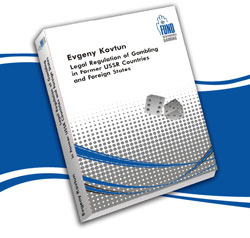The first English-language edition of Evgeny Kovtun’s book “Legal regulation of gambling in former USSR countries and Foreign States”

The Responsible Gaming Fund and Storm International are announcing the first English-language edition of Evgeny Kovtun’s book “Legal regulation of gambling in former USSR countries”.
The book gives full and comprehensive analytical coverage of the legal regulation of gambling in ex-USSR countries (the Russian Federation, Belarus, Ukraine, Moldova, Latvia, Lithuania, Estonia, Azerbaijan, Armenia, Georgia, Kazakhstan, Kyrgyzstan, Uzbekistan, Turkmenistan and Tajikistan). The author provides a detailed account of the history of gambling regulation in the USSR and a survey of the current legislation.
The publication is recommended for officers of any legislative authorities, civil servants, teachers, postgraduate and undergraduate students of law universities and departments, gambling operators and high readership.
The book is based on the legislature in effect as of December 1, 2008, unless otherwise stated.
The presentation of the book was held at Gaming Awards ceremony in London on 26th of January 2009.
The book can be ordered at www.responsible.ru/eng/book or via e-mail bookorder@responsible.ru
About the author: Evgeny Vyacheslavovich Kovtun
Graduated from Moscow State University of Communication Routes (MSU CR) and All-Russian State Tax Academy (ARSTA). Diploma magna cum laudae, thesis “Legal regulation of gambling in the Russian Federation”. A famous publicist in the area of gambling regulations and the author and co-author of a number of books devoted to the history of gambling and its legal regulation. The latest books, “Gambling in Russia: Legal Regulation”, “Legal Regulation of Gambling in Foreign Countries” (together with Sergey Kovalyov) and “Legal Regulation of Gambling in Ukraine and Adjoining States” (in Russian and Ukrainian) have been appreciated not only in the Russian Federation, Ukraine, Belarus, but also in some foreign states. The articles by Evgeny Kovtun on the legal regulation of gambling have been translated into a wide range of languages, including English, Bulgarian, Polish, Romanian, Ukrainian, Armenian, Georgian, and Lithuanian.



































rules for writing comments